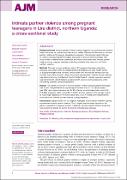Intimate partner violence among pregnant teenagers in Lira district, northern Uganda: a cross-sectional study
Date
2020Author
Auma, Anna Grace
Ayebare, Elizabeth
Olwit, Connie
Ndeezi, Grace
Nankabirwa, Victoria
Tumwine, -James K
Metadata
Show full item recordAbstract
Background/aims Intimate partner violence during pregnancy is associated with adverse
health outcomes for mothers and their unborn babies. Whereas the literature on intimate
partner violence in the general population is extensive, little is known about this type
of violence among pregnant teenagers, especially in resource-limited settings. This
study aimed to determine the prevalence and factors associated with intimate partner
violence among pregnant teenagers attending antenatal care clinics in Lira District,
northern Uganda.
Methods This was a cross-sectional study of 310 pregnant teenagers attending
antenatal care clinics at the Lira Regional Referral Hospital and Ogur Health Center
IV. Eligible teenagers were recruited consecutively until the required sample size was
accrued. Data were collected using a structured questionnaire. Intimate partner violence
was determined using the Revised Conflict Tactile Scale 2. Logistic regression analysis
was performed to identify factors associated with violence during pregnancy, while
considering potential confounding factors.
Results The overall prevalence of intimate partner violence among pregnant teenagers
was 40.6%. The prevalence of psychological violence was 37.1%, sexual assault
was 29%, and physical violence was 24.8%. Partner alcohol intake (odds ratio=5.00,
P=0.000); polygamy (odds ratio=2.80, P=0.001) and the inability of the teenage mother
to make major decisions in the home (odds ratio=2.42, P=0.006) were independently
associated with intimate partner violence during pregnancy.
Conclusions Approximately 4 in 10 pregnant teenagers in Lira district, northern Uganda
experienced intimate partner violence. This is higher than has been reported in the
general population of pregnant women in Uganda. Intimate partner violence screening
and counselling should be part of the routine antenatal care package.
Collections
- Research Articles [41]

